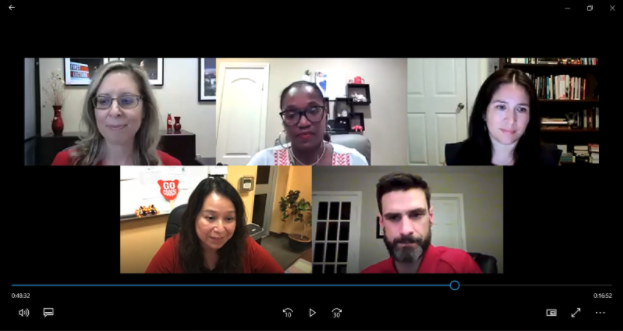

The UH Alumni Association and the College of Education held a virtual panel that discussed navigating through public crises and tips for managing uncertainty on Nov. 16.| Lisa El-Amin/The Cougar
The UH Alumni Association and the College of Education discussed navigating through public crises with tips for managing uncertainty virtually on Nov. 16.
Four speakers, including a member of the alumni association, shared information and perspectives of public issues that affect our community in addition to solutions to combat the crisis with the dean of the College of Education Robert McPherson as the moderator for the panel.
Diana Castillo
Alumna Castillo shared her personal experience with handling crises during the start of the pandemic as principal of Pilgrim Academy.
“It was a very difficult time for me, my father passed away in February and six weeks later we were being pulled into a prinicpal’s meeting that rarely ever happens, to talk about yet another highly contagious disease with no vaccine and all the unknowns that we were being faced,” Castillo said. “By the following day, they shut us down.”
Like many, Castillo was under stress with the extremities of COVID-19 due to the unpredictableness of the pandemic. However, she continued to maneuver through it all and shared with the viewers how she offered support for students dealing with grief.
“We need to just acknowledge it,” Castillo said. “We need to talk to them, we need to monitor our students and ask them, ‘would you like to talk to the counselor’, and just allow them to speak to you.”
Blake Allan Ph.D.
Allan broadly discussed how a negative workspace affects an individual’s mind space.
In his research, he acknowledges the existing trends of marginalized groups before the pandemic and how they experience hardships with lower paying jobs. Since the pandemic, Allan said other groups have faced similar inequities.
“So we see huge layoffs, lost wages, lost hours and we were all struggling during these times,” Allan said. “We have kind of lost people we love, but also losing our sense of security in our work, sense of safety and health.”
Ruth M. López Ph.D.
López talked about the pandemic affecting Latinx communities, specifically the Latina students. She partnered with researchers to interview Latina high school seniors and college students to gain an understanding of how they dealt with the academic transition with COVID-19.
“Students have also shared their responsibilities as caretakers to younger relatives and elders recovering from COVID-19,” López said. “Some have shared that they had to help their siblings with online school while they were in their own classes and saying that their professors never saw this.”
López shared that at the start of the pandemic, things such as having access to the internet were problems for students. However, she said the support from educators during the transition was notable for the students she interviewed.
“Students have shared about the impact of caring educators,” López said. “So either through high school or college those educators that were there going through it with them with the pandemic who went the extra mile to be flexible and supportive.”
April Peters-Hawkins Ph.D.
Peters-Hawkins’ research investigates leadership, race and education where she highlighted those topics with children through a scholar and parental standpoint. Her discussion emphasized that the topic of race includes speaking on racism especially during the pandemic with the Black Lives Matter movement.
“For young people, race is not just salient at this moment but historical,” Peters-Hawkins said.
In her discussion, Peters-Hawkins shared case studies involving race that became prominent in history and how they shape research today.
“The outcome (on a doll study) of that was that they found that black children had a preference to white dolls,” Peters-Hawkins said. “The larger implications of that is that black children formed their racial identity by the age of three and they attach the negativity to their own identity which was perpetuated by segregation.”
Towards the end of the navigating through crisis panel, speakers shared their final thoughts and ways of navigating through uncertain times and how to cope with crises.
“I think we really need to look into what’s going to bring us joy. For me, it was walking,” Castillo said. “Taking a nice stroll and it’s the one thing that I continue to do.”
news@thedailycougar.com
—
“Navigating crisis panel touches on pandemic effects” was originally posted on The Cougar
